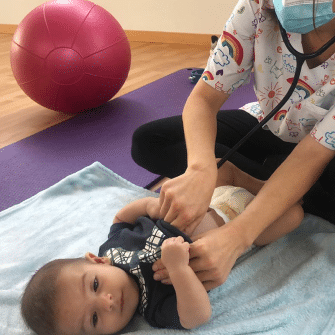The arrival of a baby to the family is a moment filled with joy and love, but it can also bring concerns, especially when the little one faces common respiratory issues.
Bronchiolitis, asthma, and pneumonia are conditions that can affect babies, making it challenging for them to breathe and causing distress for both the infants and their parents.
It is in these moments when pediatric respiratory physiotherapy becomes a great option, offering specialized techniques that not only help prevent and treat these issues but also provide support to families in facing these challenges with confidence.
What is Pediatric Respiratory Physiotherapy?
It is a specialized approach that focuses on the respiratory problems of infants and young children. These are non-invasive techniques to treat common respiratory conditions such as bronchiolitis, asthma, and pneumonia. Through carefully designed techniques, physiotherapists assist the little ones in clearing secretions and mucus from the lungs, thereby improving their lung capacity and facilitating easier and more effective breathing.
How do these techniques help?
Clearing of secretions:
The buildup of secretions in the lungs can make it difficult for the baby to breathe. Physiotherapy employs gentle yet effective techniques to help clear these secretions, relieving discomfort and enabling the baby to breathe more easily.
Improvement of lung capacity:
The techniques used in respiratory physiotherapy help expand the lungs and improve the baby’s lung capacity. This is crucial for efficient breathing and aids in preventing future respiratory problems.
Learning home techniques:
Physiotherapists not only work with the baby during sessions but also teach parents techniques they can use at home. These specific exercises and massages are crucial for maintaining the baby’s breathing in good condition and provide parents with the necessary information and education to actively participate in the care of their child.
Emotional support for families:
Facing respiratory issues in a baby can be stressful and emotionally challenging for parents. Physiotherapists not only provide physical care but also offer emotional support to families, helping them understand their baby’s condition and providing the confidence needed to care for them at home.
Breathe deeply
The benefits of respiratory physiotherapy extend to the child’s everyday life. The transformation is evident when the child, once limited by breathlessness, now runs with joy, engages in physical activities, and sleeps soundly at night. Pediatric respiratory physiotherapy not only treats symptoms; it allows children to explore the world with more freedom.
It is a testament to the power of physiotherapy to heal, strengthen, and offer hope, even in the most challenging moments. With proper support and dedicated care, the quality of life improves significantly.
At QSANA, we understand the importance of not only providing treatment within our facilities but also educating families to become active participants in their children’s recovery process. We believe that effective care doesn’t end when the child leaves our facilities; in fact, that’s where a meaningful journey towards continuous improvement begins.
This guidance not only ensures the continuity of treatment but also provides parents with the necessary confidence to manage their child’s health needs outside the clinical setting.
Furthermore, we understand that emotional and psychological support is as essential as physical treatment. At QSANA, we provide support to families every step of the way. We comprehend the concerns, fears, and questions that may arise. We are here to provide clear answers, emotional support, and guidance to help you navigate these situations effectively.


